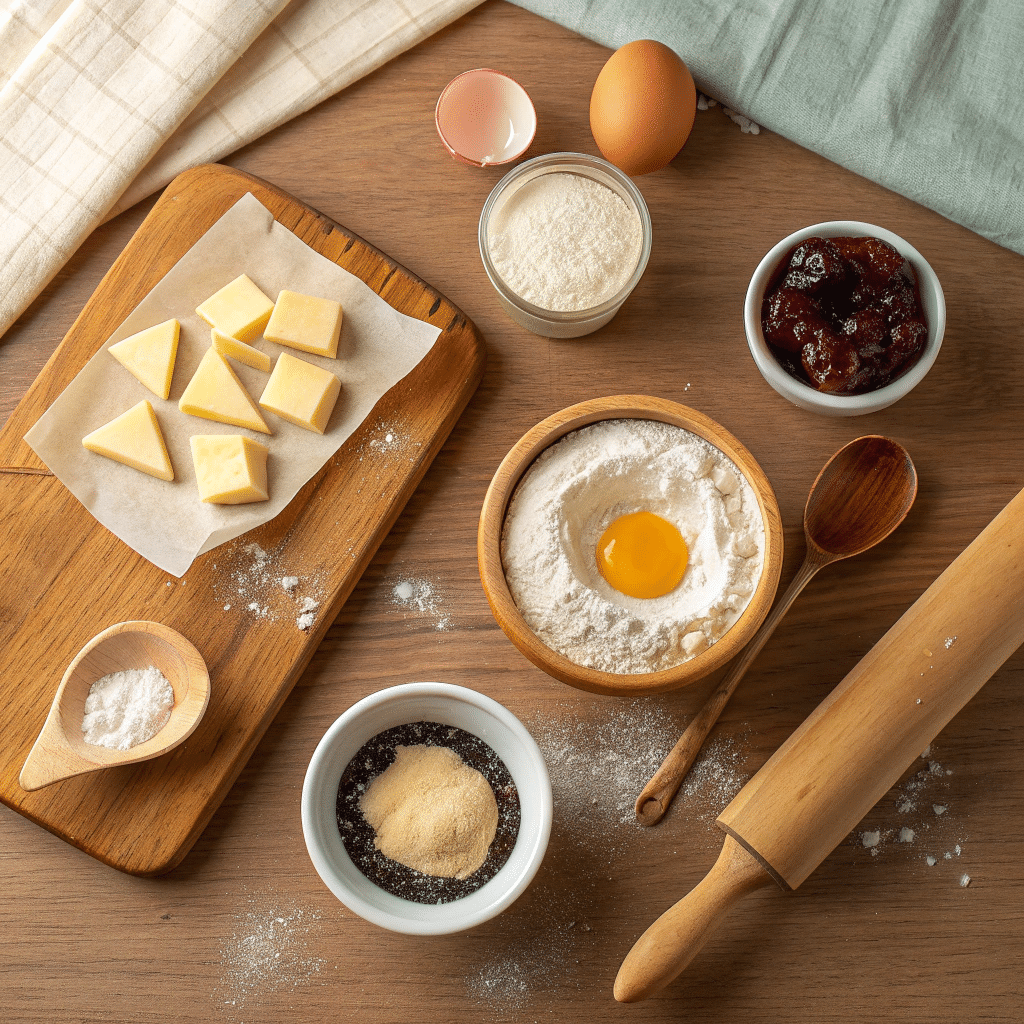There’s something magical about baking cookies that carry centuries of history. Every Purim, I find myself reaching for this recipe — Hamantaschen Purim Cookies — those delightful triangle-shaped pastries with fruity or nutty centers. They’re soft, buttery, and slightly crumbly, just the way they should be. Whether you’re celebrating Purim or simply craving something festive, these little pockets of joy are worth every bite.
What Are Hamantaschen?
If you’ve never heard of them before, Hamantaschen cookies are traditional Jewish cookies made especially for Purim, a joyful holiday that celebrates victory, community, and sharing food with friends. Each cookie is shaped like a triangle — said to represent Haman’s hat or ears, depending on the story version you grew up with.
But beyond symbolism, they’re just plain delicious. The best part? You can fill them with just about anything — fruit preserves, poppy seed filling, or even chocolate hazelnut spread if you’re feeling modern. Every family seems to have its own “best hamantaschen recipe,” and honestly, that’s part of the charm.
Ingredients You’ll Need

Let’s keep this simple and home-baker friendly. You likely have most of these in your pantry already.
For the dough:
- 2/3 cup unsalted butter, softened
- 1/2 cup granulated sugar
- 1 large egg
- 1 teaspoon vanilla extract
- 2 cups all-purpose flour
- 1 teaspoon baking powder
- Pinch of salt
- 1–2 tablespoons milk (if needed, for consistency)
For the filling:
You can go classic or creative here!
- Traditional: 1/2 cup poppy seed filling or fruit preserves (apricot, raspberry, or prune are Purim favorites)
- Modern twist: Chocolate spread, date paste, or lemon curd for a brighter flavor
How To Make Hamantaschen for Purim
Here’s the fun part — baking! Grab a cup of coffee (or maybe something stronger; I won’t tell), and let’s dive in.
Step 1: Make the Dough
Cream the butter and sugar together until light and fluffy. Add the egg and vanilla extract, mixing until combined.
In a separate bowl, whisk together flour, baking powder, and salt. Gradually add the dry ingredients to the wet mix until a soft dough forms. If it’s a bit crumbly, add a splash of milk — just enough to bring it together.
Pro tip: Don’t overmix. You want a tender cookie, not a workout for your jaw.
Step 2: Chill It
Wrap the dough in plastic wrap and let it rest in the fridge for about 30 minutes. This step makes it easier to roll and shape later. Patience here pays off.
Step 3: Roll and Cut
Lightly flour your surface and roll the dough to about 1/8-inch thickness. Use a round cutter (or even a drinking glass) to cut circles, around 3 inches wide.
Step 4: Fill and Fold
Place a small spoonful of filling in the center of each circle — don’t get carried away or your cookies will burst open. Then, fold the edges up to form a triangle, pinching the corners tightly.
It’s okay if they look a little imperfect — they’re homemade, not from a factory line.
Step 5: Bake
Arrange them on a parchment-lined baking sheet and bake at 350°F (175°C) for about 12–15 minutes, until the edges are lightly golden. The smell alone will have your kitchen feeling like a bakery.
Step 6: Cool and Enjoy
Let them cool before transferring to a rack. The filling will be molten-hot at first (trust me, I’ve learned that lesson more than once). Once cooled, dust lightly with powdered sugar or just enjoy them plain.
Tips for the Perfect Hamantaschen Cookies
- Seal the edges firmly. Pinch those corners well so they don’t pop open while baking.
- Avoid overfilling. A teaspoon of filling is plenty. Any more and it’ll ooze out.
- Try different fillings. Think outside the traditional — fig jam, dulce de leche, or even savory combos like feta and caramelized onions for a savory hamantaschen recipe twist.
- Experiment with dough flavors. A touch of citrus zest or almond extract can add a fun surprise.
Filling Ideas to Mix Things Up
If you love experimenting like I do, you’ll have a blast with fillings. Here are some ideas to inspire your next Purim bake-off:
- Classic: Poppy seed filling or prune jam — timeless choices.
- Fruity: Apricot, strawberry, or fig preserves.
- Nutty: Peanut butter and chocolate chips (yes, really!).
- Savory: Goat cheese and herbs for a snackable twist.
- Sweet tooth special: Chocolate ganache or cookie butter.
That’s the beauty of hamantaschen recipes — they adapt to your taste and your pantry.
A Little Story From My Kitchen
Last Purim, I baked three batches — one with apricot jam, one with poppy seed, and one accidental masterpiece: Nutella and sea salt. My friends devoured them faster than I could refill the cookie plate. That’s when I realized hamantaschen aren’t just about tradition — they’re about sharing. There’s something heartwarming about gifting a plate of homemade hamantaschen cookies wrapped in parchment and tied with a string.
Make-Ahead and Storage Tips
- To freeze the dough: Shape into a disk, wrap well, and freeze up to two months.
- To freeze baked cookies: Cool completely and store in airtight containers for up to a month.
- To store: Keep at room temperature for 4–5 days in a sealed jar or tin. They actually get softer after a day, which makes them even better.
Purim Baking Ideas
If you’re hosting a Purim party or sharing baskets (mishloach manot), pair your Purim cookies with other treats like rugelach, chocolate bark, or homemade fruit candies. Add a small note or tag explaining the filling flavors — it’s a sweet personal touch that guests always love.

Hamantaschen Purim Cookies
Ingredients
Method
- Beat butter and sugar together until light and creamy. Add egg and vanilla, and mix well. In another bowl, whisk flour, baking powder, and salt. Add dry ingredients to the butter mixture. Mix until a soft dough forms. If it feels too dry, add a tablespoon or two of milk.
- Shape the dough into a flat disc, wrap it in plastic, and chill in the refrigerator for about 30 minutes. This helps it roll out easily and hold its shape.
- On a lightly floured surface, roll the dough to about 1/8-inch thick. Use a round cookie cutter (or glass) to cut circles about 3 inches across.
- Spoon about 1 teaspoon of filling into the center of each circle. Fold up the edges into a triangle shape, pinching each corner tightly so they don’t open during baking.
- Place cookies on a parchment-lined baking sheet. Bake in a preheated oven at 350°F (175°C) for 12–15 minutes, until the edges turn light golden.
- Let them cool on the baking sheet for a few minutes before transferring to a wire rack. Once cooled, enjoy as-is or dust lightly with powdered sugar.
Notes
FAQs About Hamantaschen Purim Cookies
Q1: Why do hamantaschen sometimes open while baking?
Usually because the dough wasn’t chilled enough or the corners weren’t pinched tightly. Try brushing the edges with a little egg white before folding — it helps them stay closed.
Q2: What’s the best filling for hamantaschen?
Traditionally, poppy seed and fruit preserves are the most popular, but honestly, anything thick and not too runny works beautifully.
Q3: Can I make hamantaschen without dairy?
Absolutely. Swap butter for margarine or coconut oil for a dairy-free version.
Q4: How thick should the dough be?
Around 1/8 inch. Too thin, and it tears; too thick, and you’ll lose that delicate texture.
Q5: Are hamantaschen served warm or cold?
They’re best at room temperature, but slightly warm cookies with gooey filling? Irresistible.
Final Thoughts
Hamantaschen Purim cookies are more than just baked treats — they’re little edible symbols of joy, history, and togetherness. Every fold, every pinch of dough tells a story passed through generations. Whether you’re keeping tradition alive or giving it your own twist, these cookies make Purim (or any day) a little sweeter.
So roll up your sleeves, grab that jar of preserves, and bake a batch. You’ll taste celebration in every bite.

